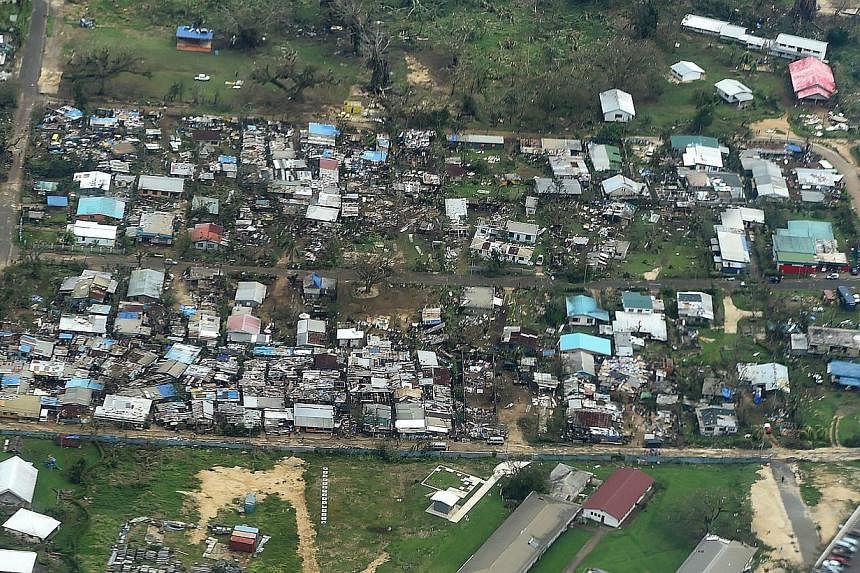SUVA (Fiji) - Aid agencies described conditions in cyclone-ravaged Vanuatu as among the most challenging they have ever faced, as the Pacific nation's President blamed climate change for worsening the devastation.
Save the Children's Vanuatu director Tom Skirrow said the logistical challenges were even worse than when Super Typhoon Haiyan struck the Philippines in November 2013, killing more than 7,350 people and ravaging an area as big as Portugal.
"I was present for the Haiyan response and I would 100 per cent tell you that this is a much more difficult logistical problem," he said. "The numbers are smaller but the percentage of the population that's been affected is much bigger."
Ms Aurelia Balpe, head of the Pacific office of the International Federation of Red Cross and Red Crescent Societies, agreed that the task facing aid agencies was likely unprecedented in the region. "I don't think there has ever been destruction on this scale in one place," she said.
Care International spokesman Tom Perry said flying into the capital, Port Vila, where up to 90 per cent of homes have been damaged, was "startling". "It's been flattened, all that green is basically horizontal. Trees are just kind of standing like broken toothpicks, it's quite startling... it's hard to find a home that hasn't been hit," he told the Australian Broadcasting Corporation.
Oxfam country director in Port Vila, Mr Colin Collett van Rooyen, said the lack of clean water, temporary toilets, water purification tablets and hygiene kits needed to be addressed rapidly.
"Friday night was the first emergency with the arrival of Cyclone Pam; disease will be the second emergency without clean water, sanitation and hygiene provision," he said. "There are more than 100,000 people likely homeless, every school destroyed, evacuation centres full, damage to health facilities and the morgue."
Mr Skirrow said flights over remote islands had confirmed widespread destruction elsewhere in the impoverished nation of 270,000. "It's frustrating, we're still stuck in a small part of Port Vila, we can't even get to the north of this island (Efate) to find out what's going on," he said.
"I am absolutely sure there will be at least 150,000 people significantly affected, most likely homeless, and about 75,000 of them will be children."
The Singapore Red Cross said it will contribute US$25,000 (S$34,800). The amount, from its Disaster Response Emergency Fund, will be used to purchase much-needed emergency relief items for Vanuatu, a media statement said yesterday.
Pacific nations regard themselves as at the front line of climate change, given that many are low-lying islands dangerously exposed to rising sea levels.
"Climate change is contributing to the disaster in Vanuatu," President Baldwin Lonsdale earlier told reporters in Japan, where he was attending a United Nations disaster conference. He said the rain had been unusually heavy this year.
Military planes from Australia, New Zealand and France were arriving loaded full of food, shelter, medicine and generators, along with disaster relief teams.
The UN Office for the Coordination of Humanitarian Affairs said the cyclone, which was the maximum category five, had affected countries across the South Pacific, including the Solomon Islands, Kiribati, Fiji, Tuvalu and Papua New Guinea.
The UN had unconfirmed reports that the cyclone had killed 44 people in one province alone on Vanuatu, which has more than 80 outlying islands. The official death toll yesterday was eight.
AGENCE FRANCE-PRESSE








